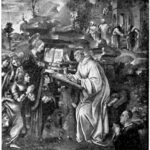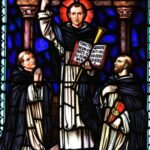St. Olympias
Saint Olympias
When they lived:
St. Olympias, also known as Olympia, lived during the late 4th and early 5th centuries, precisely from around 361 to 408 AD.
Where they lived:
Born in Constantinople (modern-day Istanbul, Turkey), St. Olympias spent the entirety of her life in the Byzantine Empire’s capital. This bustling city, a crossroads of cultures and power, would significantly influence her journey.
Notable world events during the time of their life:
- The Sack of Rome (410 AD): Olympias lived through the fall of Rome, a pivotal event that marked the first time in almost 800 years that the city had been conquered. This event shook the Western world and reshaped the geopolitical landscape of Europe.
- Council of Nicaea (325 AD): Though this event occurred before her time, the Council of Nicaea’s reverberations continued during Olympias’ life. The debates and decisions of this ecumenical council played a crucial role in shaping the early Christian Church’s theology and structure.
- The Huns’ Invasions (4th and 5th centuries): The Huns, a nomadic warrior group from Central Asia, wreaked havoc across Europe during Olympias’ lifetime. Their invasions led to the movement of various tribes and peoples, contributing to the fall of the Western Roman Empire.
- Theodosian Code (438 AD): Emperor Theodosius II completed the Theodosian Code, a comprehensive compilation of Roman laws that significantly influenced subsequent legal systems in the Byzantine Empire and beyond. This legal document played a crucial role in shaping the administration of justice in the Eastern Roman Empire.
- Development of Monasticism: The 4th and 5th centuries were pivotal for the development of Christian monasticism. Influential figures like St. Anthony the Great and St. Pachomius laid the foundations for the monastic tradition, which would later become a hallmark of Christian spirituality.
Their patronage:
St. Olympias is revered as the patron saint of widows, the suffering, and the wronged. Her story is a testament to her unwavering dedication to the Christian faith and her commitment to helping the less fortunate. Despite her privileged background, Olympias chose a life of selflessness and service, using her resources to provide for widows, orphans, and those who had been marginalized by society.
Olympias’ impact extended beyond charity work. She played an active role in Church affairs, even in an era when ecclesiastical politics were tumultuous. Her steadfast loyalty to her spiritual mentors, including St. John Chrysostom, showcased her resilience in the face of adversity.
In an age marked by both spiritual fervor and worldly turmoil, St. Olympias’ story emerges as a beacon of compassion, resilience, and unwavering faith. Her legacy reminds us that even in the most challenging of times, individuals can make a lasting impact by embodying the virtues of kindness, justice, and devotion to higher ideals.
Early Life
Olympias, also known as Olympias the Younger, differentiates her from her late paternal aunt, who was once engaged to Roman Emperor Constans. She was of noble birth, born into an illustrious family with Greek ancestry.
Her father was Seleucus, a wealthy Greek rhetorician, and her mother was an Antiochian Greek noblewoman named Alexandra.
Olympias was born around 361. She was said to have been born and raised either in Constantinople or Antioch. She was the heir to a large fortune.
Sadly, Olympias was orphaned and taken into custody by her paternal Christian uncle, Procopius. Her nanny was Theodosia, a good Christian. Together, they raised Olympia into an intelligent, God-fearing young woman.
Young and Rich
In 384 or 385, after about 18 years, she married Nebridus, a Prefect of Constantinople. Their union was short-lived and they had no children. Nebridus died two years after their marriage, leaving Olympia a Young, rich widow.
Young, attractive, and wealthier, many suitors sought to marry her soon after she lost her husband. But Olympias had decided to live the rest of her life as a consecrated widow. Emperor Theodosius had recommended his cousin Elpidius as a suitable match for Olympias, an offer she turned down.
Irritated at her refusal to wed, his cousin, Emperor Theodosius, confiscated her fortune and placed it in the trust of the Urban Prefect Administration until she was 30. Notwithstanding the loss of her wealth,Olympias devoted her life to charity and the service of God.
Passion at the Service of God
Olympias continued to be a generous giver—too helpful, even. She gave everything she had to charity and supported the church. Working in the church and for God was all she lived for.
In 391, following her appeal and boldness of speech, emperor Theodosius restored Olympias to the administration of her fortune. She promptly put the money to use, building hospitals and orphanages, donating to charity and the church, caring for the sick, and sheltering monks running away from persecution in Egypt.
In 398, Olympias built a convent where she and other young women retired to live a monastic life. The community grew in number, and Olympias became a sort of abbess in the community.
At 30, she was consecrated a Deaconess by Nectarius, bishop of Constantinople. Later, when John Chrysostom (St.) became the bishop of Constantinople, he became a spiritual guide for Olympias and her community of sisters.
Fellowship with St. John Chrysostom
Olympias found in John Chrysostom a friend, confident, and spiritual guide. A fiery preacher, John is reputed to shun dinner parties but would accept food prepared by Olympias.
It was John who guided Olympia on how to properly use her enormous fortune for charity. Owing to her large heart, many people tried to take advantage of her, knowing how quickly she gave up a good course.
Olympias and John Chrysostom have in common an ascetic lifestyle and devotion to caring for the poor. Olympias was friends with many notable holy people, including Gregory of Nazianzen and Gregory of Nyssa.
Following a fallout with Empress Eudoxia, John Chrysostom was banished in 404. The Empress had assumed John’s denunciation of extravagance in feminine dressing was aimed at her.
Standing Firm with the Truth
While in exile, Olympias still stood with John, helping in any way she could. She refused to associate with the newly appointed successor, maintaining the unlawfulness of the action against John.
John had always preached against abuse of power by religious and political leaders, which earned him some foes, notably Theophilus, the Patriarch of Alexandra, and the Empress.
Standing with John and being a loyal disciple of his soon-to-be prosecution to Olympias She was slandered and persecuted for refusing to accept Arsacius and his successor, Atticus, who had usurped John’s position.
Atticus, the new bishop, disbanded her community and stopped her charities. Olympias was forced into exile at Nicomedia. She left behind everything she had and the city she had known all her life.
While in exile, John sent letters to comfort her during the persecution against her. She fell sick while still in Nicomedia.
On July 25, 408, she passed away, just about a year after John Chrysostom’s death.
5 Interesting Facts About St. Olympia
- Do you know that St. Olympias is one of the 140 colonnade saints at
St. Peter’s Square, Basilica of Rome Her statue was erected.
1667-1668. - Her coffin was thrown into the sea, following the instructions she
had left behind before her death. She wished her final resting
place would be decided by God. The coffin was carried by waves to
Brokthoi, a suburban shore near Constantinople. - Are you willing to stand up for justice, and what is correct at your
discomfort? St. Olympia stood with the truth even at the
detriment of her life and comfort. - Not many know that 17 of those correspondences she received from
John Chrysostom while in exile are still intact. - James 2:26: Faith without work is dead’. St Olympias,
Through her works, she lived her faith. An exemplary life of preaching
faith and doing it.
Prayer to St. Olympias
Although there is no official prayer to St. Olympias, from the Roman Missal, a prayer for the Common of Holy Women could be adopted.
God, the exaltation of the lowly, who willed that blessed Olympias should excel in the beauty of her charity and patience, grant, through her merits and intercession, that, carrying our cross each day, we may constantly persevere in love for you. Through our Lord Jesus Christ, your Son, who lives and reigns with you in the unity of the Holy Spirit, one God, forever and ever Amen.
(from The Roman Missal: Common of Holy Men and Women, For a Holy Woman)



